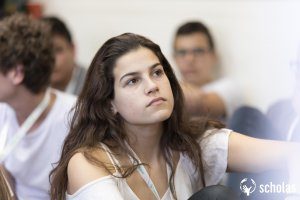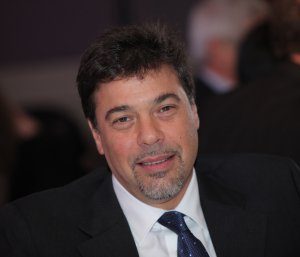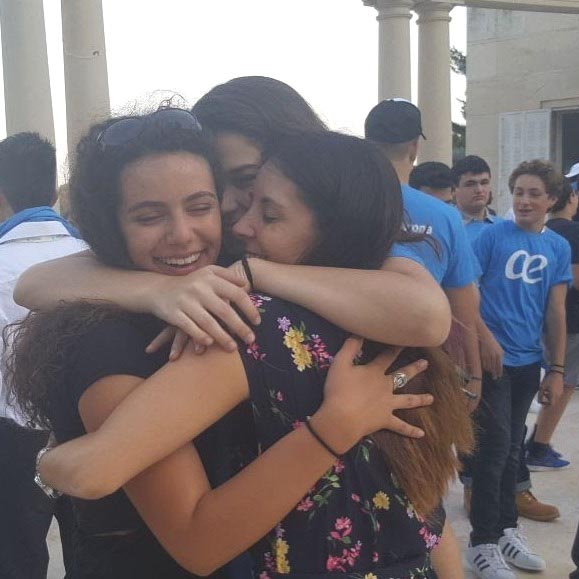In his book The Dignity of Difference, Rabbi Jonathan Sacks reflected that it was no coincidence that the Israeli national anthem was called HaTikva, meaning hope, because hope was, he wrote, an active virtue, “the faith that, together, we can make things better”.

Without hope, life would be impossible, says Milena Feferovich.
And it is hope as an “active virtue” which 16 ORT students from Argentina, Mexico, Spain and Israel have taken away with them from an emotionally intense four-day programme at the Hebrew University in Jerusalem.
They were among 75 teenagers from Africa, Europe, Latin America and the Middle East who came together for the Interreligious Citizenship Encounter, an initiative by the Pope’s Scholas Ocurrentes Foundation to encourage young people to tap into their experiences and concerns and make positive changes in themselves and their communities.
“Seeing 75 people from so many different backgrounds living together in such harmony I don’t see why it wouldn’t be possible to extend this harmony to the whole world,” said ORT Argentina student Milena Feferovich. “I have a lot of hope for the future. If there is no hope, there is no life possible.”
Mai Barishasky, one of six Israelis who participated through World ORT Kadima Mada, agreed:
“Meeting those people from all over the world that want to make the world a better place, and finding solutions to problems all over the world, made me feel that there is real hope for peace and I’m very thankful for that.”
For students from World ORT’s Estrella Toledanos School in Madrid it was an experience which had opened their eyes and their minds.
Leon Benhamu Ajuelos said: “Before this I didn’t know any Arab people or anything about their religion. Here I’ve met people from all backgrounds and realised that everyone is the same.”
His friend, Josef Edery Anahory, added: “This has been an opportunity to learn a lot about cultures and religions and that enrichment of knowledge makes you a better person… I’ve realised that if you listen and are interested in other cultures you can also enrich your own religion and that’s good.”

Listening to others and showing an interest in their culture enriches your own religion, says Josef Edery Anahory.
The teenagers worked, played, danced and sang together, above all they listened to each other. Each day they split up into four groups – artists, musicians, poets and thinkers – according to their talents and preferences. And in these groups they worked on projects which they presented to academics from 70 universities who had gathered there for the Scholas World Congress to develop a “culture of encounter” for peace.
Projects ranged from the creation of a bus bearing Israeli and Palestinian children that could tour the Old City of Jerusalem promoting the Scholas vision through sport, art and technology to a song for peace.
World ORT Kadima Mada student Dany Leon said it was “amazing” working together on the projects and hoped to replicate the experience of opening minds to other cultures with other members of the ORT family.
“We’ll stay in touch with the other ORT students who came to Jerusalem,” she said. “We already have a Whatsapp group!”

World ORT is committed to the principles of dialogue, exchange and learning, says Chair of the Board of Trustees, Dario Werthein.
The participation of the ORT students in this Papal initiative, let alone the success of this collaboration should not come as a surprise.
ORT students in Argentina have been involved in Scholas’s Escuela de Vecinos programme, in which they identify common concerns with Protestant, Catholic and Muslim peers and work together to develop solutions, since 2001. And ORT Argentina’s school was the first to join Scholas’s global network, which now has more than 446,000 schools in 190 countries.
This long history of working together is mirrored by the relationship between Scholas Ocurrentes and the Foundation set up in memory of Leon Werthein, the father of World ORT’s Board of Trustees, Dario Werthein, who is based in Argentina.
So it was natural for Scholas Global President Jose Maria del Corral to approach Mr Werthein to seek ORT’s involvement – and just as natural for Mr Werthein to respond enthusiastically by immediately asking World ORT Networking Coordinator for Latin America Amelie Esquenazi to find suitable candidates.
“I knew it would be a great opportunity for our young people,” Mr Werthein said. “Dialogue and communication are the best tools which we can use to coexist with our neighbours. And since ORT is committed to the principles of dialogue, exchange, and learning to nurture ethical citizens it filled me with pride that our schools could take part in this initiative… Hopefully, our students will be among those who will sow the seeds of a better world in which there will be the peace we have all longed for.”
He added: “As a community leader I will continue to work to generate more meetings like this.”





